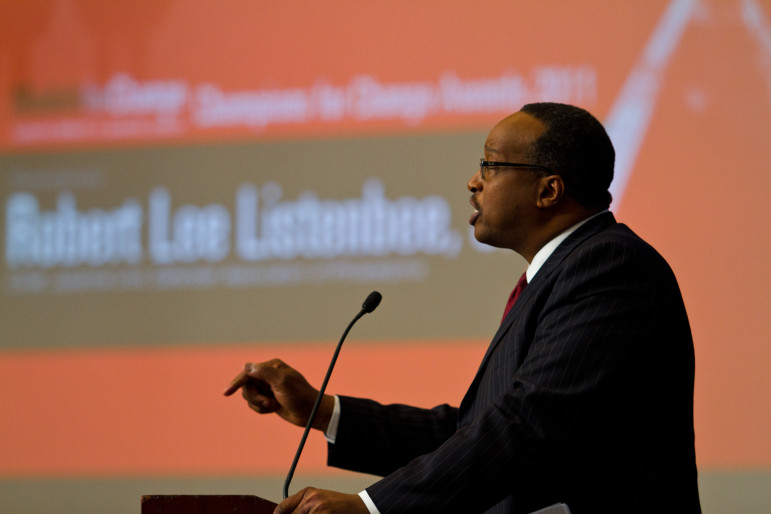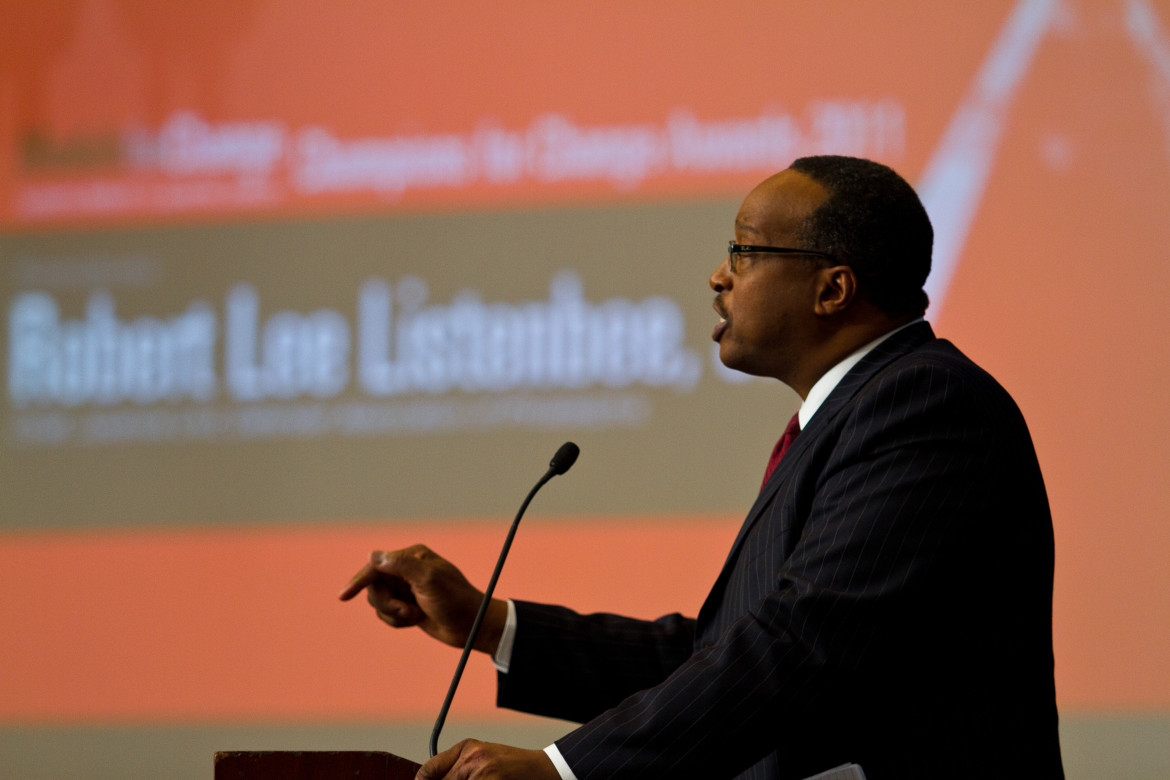
Robert L. Listenbee Jr. views himself as a juvenile justice visionary.
Many juvenile justice advocates agree, as Listenbee prepares to enter his third year as administrator of the federal Office of Juvenile Justice and Delinquency Prevention (OJJDP).
Listenbee, the first African-American to head OJJDP, brought to the job nearly three decades of experience as a juvenile defender in Pennsylvania.
His efforts reforming the juvenile justice system in the Keystone State as a trial lawyer, then as chief of the juvenile unit of the Defender Association of Philadelphia drew widespread praise. And in 2011, he received a Champions for Change Award from the Chicago-based John D. and Catherine T. MacArthur Foundation’s Models for Change program for leading reform efforts in Pennsylvania.
Listenbee, who earned a bachelor’s degree from Harvard University and a law degree from the University of California at Berkeley, also co-chaired the Attorney General’s National Task Force on Children Exposed to Violence. The task force issued its final report in December 2012, about two months before President Barack Obama tapped Listenbee to lead OJJDP.
In his current role, Listenbee has emphasized working with organizations known for their juvenile justice reform efforts. Among them: the Baltimore-based Annie E. Casey Foundation, the MacArthur Foundation and the Boston-based Robert F. Kennedy Children's Action Corps at the RFK National Resource Center for Juvenile Justice.
Listenbee also has strongly supported efforts to reduce disproportionate minority contact with the juvenile justice system and spoken out about the importance of reauthorizing and strengthening the 1974 Juvenile Justice and Delinquency Prevention Act.
The JJDPA, which established OJJDP, is supposed to be reauthorized every five years, but has not been reauthorized since 2002 and has not undergone major changes in nearly two decades. Under the JJDPA, states receive federal grant money based on compliance with four core requirements — standards for the custody and care of youths in the juvenile justice system.
Supporters credit Listenbee with helping turn around an agency that had long been plagued by low morale, waning influence and frequent changes in leadership.
But recently, Listenbee’s tenure as the nation’s juvenile justice leader has been beset by controversy.
In mid-January, Sen. Charles E. Grassley, R-Iowa, asked the U.S. Justice Department to respond to whistleblowers’ claims that OJJDP had knowingly violated federal law by giving grants to states that incarcerated runaway foster children and other “vulnerable minors.”
Then the president of the union representing OJJDP’s estimated 40 rank-and-file members (of about 70 employees) called for Listenbee’s resignation.
Marilyn Moses, president of Local 2830 of the American Federation of State, County and Municipal Employees, said in an interview that OJJDP has “spiraled out of control” and morale has plummeted under Listenbee’s leadership.
In response to a long-pending JJIE request for an in-person interview, Listenbee answered written questions by email on Thursday. Edited excerpts of the email interview follow.
JJIE: Do you have any comment on the union’s call for your resignation?
Listenbee: It would be inappropriate to comment on any ongoing management and labor relations discussions. What I can say is that I am certain the Office of Justice Programs [of which OJJDP is a part] has been working to address concerns raised by AFSCME Local 2830. Because I value my team, I fully support this process and will continue to do so in any manner possible.
JJIE: How are you responding to Sen. Grassley’s inquiry?
Listenbee: The Department of Justice and the Office of Justice Programs are working with Sen. Grassley’s office and providing a thorough response to his letters.
JJIE: What are your most important accomplishments thus far in your tenure as OJJDP administrator?
Listenbee: I am very proud of the work going on at the Office of Juvenile Justice and Delinquency Prevention to address juvenile justice reform across the nation. Staff throughout OJJDP are taking the lead on creating a national framework for comprehensive reform.
Reform requires an evidence-based, trauma-informed and developmental approach. Examples of this systemwide reform can be seen in our [post-incarceration] re-entry work, our juvenile drug courts, education of youths in correctional facilities and a new reinvestment initiative, Smart on Juvenile Justice.
There are a number of worthy efforts to mention, and here are a few:
We’re working closely with many partners on programs like the Juvenile Detention Alternatives Initiative, or JDAI, to harness rigorous research and ensure that all youth who are involved in the juvenile justice system have opportunities to develop into healthy, productive adults. [JDAI, the signature juvenile justice reform effort of the Casey Foundation’s Juvenile Justice Strategy Group, strives to safely reduce unnecessary incarnation of juveniles in 250 counties across the country.] As a result of the nearly $750,000 in funding we’ve jointly marshaled with the Annie E. Casey Foundation to keep advancing the work of the JDAI, we’ll keep building upon juvenile justice reform efforts that are underway in seven targeted states and a tribal pilot site.
In 2013, the attorney general appointed a national advisory committee of experts to address the prevalence of violence among Native American and Alaska Native children. The committee held four regional hearings and five listening sessions throughout this past year, hearing from more than 150 witnesses. In November, this committee, the Advisory Committee of the Attorney General’s Task Force on American Indian/Alaska Native Children Exposed to Violence, submitted its final report, which includes 31 recommendations covering everything from funding and legislation to strengthening the child welfare and juvenile justice systems and addressing the unique needs of children in Alaska Native communities.
We are looking at those recommendations now and we have already taken a number of important steps. For instance, we are prioritizing prevention and intervention programs that are both evidence-based and culturally appropriate. We are working to make sure that tribal juvenile justice systems are helping to put youth on a positive and successful track, not retraumatizing them.
In December 2013, the National Academy of Sciences’ National Research Council released a report commissioned by OJJDP that called for a developmentally informed approach designed to keep young people out of detention facilities and involved in positive, pro-social activities. To meet that charge, OJJDP has outlined the Smart on Juvenile Justice strategy that focuses on juvenile justice reforms that maximize cost savings and support statewide system change.
JJIE: What are your most important goals as OJJDP administrator?
Listenbee: To achieve lasting positive outcomes for youth in our juvenile justice system, we need fundamental reform built on evidence-based practices and developmentally appropriate and trauma-informed approaches as well as a broad consensus, including states, practitioners, advocates and communities.
We are working closely with states and local and tribal governments to ensure that core protections are guaranteed by the Juvenile Justice and Delinquency Prevention Act. We are also focused on enhancing public safety by reducing youth violence through the expansion of the National Forum on Youth Violence Prevention and through collaboration with state and local governments.
We are also striving to eliminate inequities in the juvenile justice system where they exist. Our goal is to encourage new approaches to address racial and ethnic disparities, particularly among African-American, Hispanic and tribal youth.
JJIE: What do you see as some of the greatest potential obstacles to accomplishing these goals?
Listenbee: As OJJDP administrator, I view my position as providing federal leadership and promoting best practices across the juvenile justice field. I believe there is broad consensus for systemic reform in juvenile justice, especially given the growing body of evidence that age-appropriate and offense-appropriate responses can take children off the path to hardened criminality.
A major challenge is building consensus at the state, local and tribal levels on how to specifically achieve reform. Each stakeholder and every person working in this field has a slightly different perspective on juvenile justice, but I think we can agree we need to make the system work better for juveniles and society. We work every day to bring about the broad consensus that will result in lasting change.
JJIE: What are some of the most important functions of the administrator leading OJJDP?
Listenbee: I strive to provide effective leadership, establish priorities and goals, and to implement policies that advance best practices in juvenile justice through prevention, intervention and system reform initiatives.
In my opinion, an important — but often overlooked — function of OJJDP is to conduct research. Research is the underpinning of our juvenile justice policy. We want to develop knowledge and share it with the field. We also want to use the other tools that are available to us — training and technical assistance, grant making, policy development — to help shape the direction of juvenile justice reform.
JJIE: Who are some of the greatest influences in your life and career and why? What events in your career have helped shape you into the juvenile justice professional you are today?
Listenbee: Over the years, I’ve been fortunate to have so many amazing people come into my life to help guide and mentor me. I’ve also had the opportunity to serve as a mentor. I’ve been fortunate to have people see the potential in me and nurture it, and I am now able to see that potential in the young people of this nation.
As a former public defender and trial lawyer with nearly 30 years of service, I have dedicated myself to seeking justice for youth involved in the juvenile justice system — a system that often revictimized youth in the name of accountability. In Pennsylvania, I trained lawyers throughout the state and learned about the special challenges facing youth in rural areas.
If I had to choose one event that has further fueled my desire to seek justice for youth, it would be the Luzerne County [Pa.] “kids-for-cash” scandal. I was selected to be part of the Pennsylvania Interbranch Commission on Juvenile Justice, which was established in response to the “kids-for-cash” scandal in the juvenile courts of Luzerne County. [Between 2003 and 2008, two judges in the Pennsylvania county accepted millions of dollars in kickbacks from two private, for-profit juvenile detention facilities in exchange for sentencing children to the facilities.] We recommended major reforms to the statewide system to ensure similar injustice did not occur again.
JJIE: Do you see progress toward reauthorization of the JJDPA? How important is reauthorization? Why is it taking so long?
Listenbee: The JJDPA was reintroduced during the latter part of the last Congress. This is very encouraging. [Sen. Sheldon Whitehouse, D-R.I., and Grassley introduced the bipartisan measure in December and are expected to introduce another JJDPA reauthorization bill soon.]
Reauthorization of the JJDPA will enhance public safety, hold youth appropriately accountable, reduce reoffending and could maximize cost savings for state and communities. It also presents a unique opportunity to introduce changes that can strengthen protections for at-risk youth and youth involved in the juvenile justice system.
JJIE: After leaving the job, how would you like your tenure as OJJDP administrator to be remembered?
Listenbee: I have this extraordinary opportunity to work with a great group of people to positively impact kids’ lives, and I am indebted for this opportunity.
We are determined to achieve comprehensive reform of our juvenile justice system. This includes the adoption of evidence-based practices and a developmentally appropriate and trauma-informed approach at state and local levels.
In the United States, too many youth are held in custody for nonviolent offenses, and minority youth continue to be overrepresented in the juvenile justice system. My hope is that the juvenile justice community recognizes the need to eliminate valid court orders, criminalizing status offenders, and racial and ethnic disparities. I feel this is my charge.
[Status offenders are youths who commit nonviolent offenses such as truancy, running away from home or alcohol possession. The original JJDPA stipulated as a core requirement that states receiving federal juvenile justice grants could not detain status offenders. But in 1980, the JJDPA was amended to include an exception allowing judges to confine a youth adjudicated for a status offense if the child violated a valid court order not to repeat the offense.]
